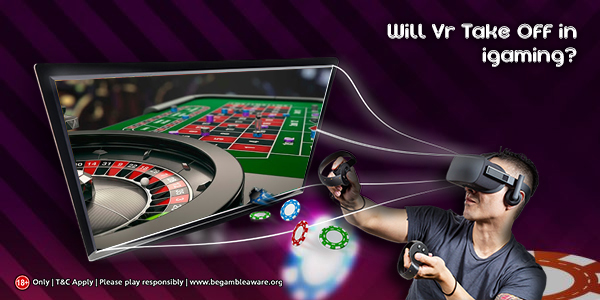The future prospects of Virtual Reality in iGaming Industry

Virtual Reality gaming or VR gaming was a concept trialled back in 1995 with the launch of Virtual Boy. It had many problems at that time though, and critics gave it bad reviews. It had terrible, wireframe, vector graphics which were displayed in a strange monochrome red colour. Even compared to the basic graphics of the SNES and the Nintendo 64, the Virtual Boy looked primitive and strange. Its VR is even more primitive. The headset had to be placed on a desk and the video did not track with the movement of your eyes or head. 3D imagery was generated using the same red-cyan lens system that was found in 3D movies at the time, giving a strange tinge to the colours. It was no surprise then that the Virtual Boy was removed from sale shortly after it was launched, and no major attempt at Virtual Reality gaming was attempted for over a decade.
The rebirth of Virtual Reality
In 2012 another Kickstarter campaign was started by the company Oculus which raised over $2 million to aid development. This was then bought by Facebook two years later for more than $2 billion. While it was another 2 years before the first retail headset appeared on the market. Since then many other companies have all got involved, developing their own VR headsets. Collectively, these companies have sold more than 10 million devices, which while impressive, is less than many had predicted and hoped for.
Reasons for VR being not so appealing
Aside from the increased cost of developing a VR game compared to a smartphone app, which some estimates put at 10 times higher, the technology is less appealing to consumers. Online casinos and later mobile apps made it far more convenient to play games like Poker, Blackjack and Roulette than had been previously possible. Before then, you either had to travel to visit a land-based casino to play. With smartphones, you can open up the app while you sit on the bus or as you watch TV at home. It is quick, easy, and convenient. On the other hand, Virtual Reality is clunky, cumbersome, and has cables trailing everywhere. The trade-off for a much more immersive experience is an inconvenience. This makes it appealing to a niche group of people who are Virtual Reality enthusiasts or who enjoy the 360-degree gaming experience.
Reasons Why Virtual Reality may take off
Although there are a lot of obstacles to the success of VR, the immersive presence of the VR experience is so compelling that it may succeed eventually. VR is a different type of experience to any other viewing activity. It is difficult for companies to sell it to consumers without helping them experience it first. In 2016, thousands of headsets were launched and sold with VR games for the first time, bringing the experience to millions of new users, helping to spread the word.
Games generating more revenue
VR headsets on their own are not very profitable, with some even slashing prices of the PlayStation VR sets several times. In contrast, the sale of Virtual Reality content like video games is much more profitable.
iGaming content
Well, it is quite logical to think that if the video games industry is profiting from Virtual Reality games, then can the iGaming industry do the same? iGaming companies are typically very quick to adopt new technology and innovation. For example, apps for smartphones have been incredibly successful. Today, customers can enjoy the same features as on desktop platforms but optimised for the smaller screens of smartphones and tablets. They have been a bit slower in developing a Virtual Reality offering, although it has been adopted by some iGaming companies.
The competition will bring down the price
Up until now, the high costs of VR headsets and powerful computers to use with them has been one of the biggest drawbacks for consumers. But as more companies enter the VR market, headset prices have gotten lower. Alternative support systems VR are cheaper than the heavyweight computers needed for headsets like Oculus or Vive. With more competition will come lower prices, higher adoption rates and more programming.
It is a part of our lives
As we become accustomed to interacting with VR, we will expect to see it in more aspects of our lives. Other news companies are also experimenting with integrating VR into their games. The slow seepage of VR into many aspects of our daily lives will bring the players to demand it as part of their iGaming experiences, too. Once VR penetrates the iGaming market more and more, it will take off.
Final thoughts
While Virtual Reality gaming has come a long way since the Virtual Boy, the slow sales of headsets show that there is no broad appeal that we see in smartphones or games consoles. Instead, the technology appeals to a niche group of enthusiasts. This makes it interesting to see how it will take off in the iGaming sector soon.
Review Summary
Review Name: The future prospects of Virtual Reality in iGaming Industry
Posted On: 27/06/2020
Author: Emma Denton





